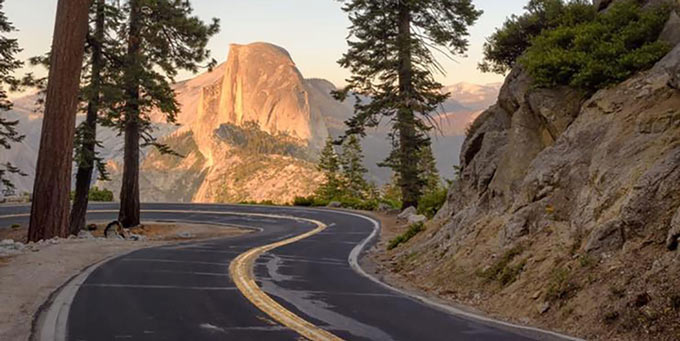
Glacier Point Road in Yosemite National Park Credit: NPS
July 1, 2025 - On Monday, the Coalition to Protect America’s National Parks, released the following:
June 30, 2025
U.S. Department of the Interior
Office of the Solicitor
1849 C Street NW
Washington, DC 20240
Subject: DOI Request for Information (RFI) regarding Regulatory Reform
To Whom It May Concern:
I am writing on behalf of the Coalition to Protect America’s National Parks (Coalition), which represents over 4,300 current, former, and retired employees and volunteers of the National Park Service. Collectively, our membership represents over 50,000 years of national park management and stewardship experience. Our members include former National Park Service directors, deputy directors, regional directors, and park superintendents, as well as a variety of program specialists and field staff. Recognized as the Voices of Experience, the Coalition educates, speaks, and acts for the preservation and protection of the National Park System, and mission-related programs of the National Park Service (NPS).
We offer the following comments in response to the Department of the Interior’s (DOI or Department) Request for Information (RFI) regarding Regulatory Reform that is posted at: https://www.regulations.gov/document/DOI-2025-0005-0001
First, we think it would be completely reasonable and appropriate for the Department and its agencies to conduct a systematic periodic review of existing regulations to identify rules that may need “improvement” of some sort. However, the focus of the current RFI is only on identifying existing regulations that could be “modified or repealed” in order to” reduce regulatory burdens,” which falls far short of conducting a meaningful or comprehensive review. A meaningful review would not just seek to identify rules that commenters believe are no longer necessary or have become too restrictive of the activities they regulate. A meaningful review would also seek to identify current regulations that may need to be made more restrictive of certain recreational and industrial activities in order to provide more effective resource protection; as well as identifying new rules that may be needed but are not yet promulgated in order to appropriately restrict certain recreational and industrial activities that may be negatively impacting resources and values on public lands,.
However, instead of conducting a balanced and objective review to identify a more complete picture of shortcomings in its existing regulatory framework, the Department has only asked for public feedback on which regulations should be made less restrictive or rescinded. In effect, DOI’s approach is the equivalent of asking regulated users and industries, such as oil and gas operators, which existing regulations they don’t like and think should be weakened or eliminated. If DOI were actually asking for balanced feedback about its existing regulations, we can think of several existing but overly lenient NPS regulations that allow inappropriate recreational activities that are demonstrably harmful to park resources and values, and therefore the applicable rule should be strengthened (i.e., made more restrictive). However, it would be pointless to comment about those NPS regulatory shortcomings here, since your “regulatory reform” motives clearly are not balanced or objective.
In general, we strongly oppose any effort by DOI to weaken or eliminate the rules that protect our national parks and public lands and the natural and cultural resources, wildlife, and recreational opportunities that these areas have to offer. We are particularly concerned that, based primarily on the comments and complaints of regulated users and industries, the Department will endeavor to weaken the implementing regulations for important laws such as the National Environmental Policy Act (NEPA), the Endangered Species Act (ESA) and the National Historic Preservation Act (NHPA). Our experience has been that such regulatory guidance and the related planning and consultation requirements are critical for ensuring that DOI agencies make informed decisions supported by best available science in order to conserve our irreplaceable natural and cultural resources for the benefit and enjoyment of future generations. As a result, we believe that the respective implementing regulations for these laws should be left largely intact. And any future revision(s) of them should be based primarily on an agency’s objective assessment that revisions would make specific regulations more efficient or effective, not based primarily on feedback solicited from regulated users and industries regarding which rules they think are too restrictive.
In closing, our national parks and public lands belong to all of us. Agency decisions about their conservation and protection should involve thoughtful consideration of an agency’s mission and legal mandates, relevant science and other information, formal consultation, and public input. Instead of soliciting public feedback focused solely on weakening rules to benefit certain users and industries, DOI should work on improving its overall approach to conservation and management of resources on public lands and on strengthening its consultation, review, and public participation processes. Any proposed changes or repeal(s) of existing regulations based on this clearly biased review process should adhere to existing procedural and consultation requirements such as those required under NEPA, NHPA, and ESA; and should be published in the Federal Register with a minimum 30-day public comment period.
Sincerely,

Philip A. Francis, Jr.
Chair of the Executive Council
Coalition to Protect America’s National Parks
The Coalition to Protect America’s National Parks represents over 3,400 current, former, and retired employees and volunteers of the National Park Service, with over 50,000 collective years of stewardship of America’s most precious natural and cultural resources. Recognized as the Voices of Experience, the Coalition educates, speaks, and acts for the preservation and protection of the National Park System, and mission-related programs of the National Park Service. More information can be found at https://protectnps.org
Source: Coalition to Protect America’s National Parks



